Nanyang Technological University
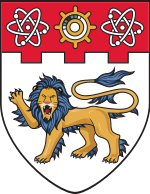 | |||||||
Former names | Nanyang Technological Institute (1981-1991) | ||||||
|---|---|---|---|---|---|---|---|
| Type | Autonomous university[1] | ||||||
| Established |
1981 (Nanyang Technological Institute) 1991 (Nanyang Technological University) | ||||||
| Endowment | S$2.3 billion (US$1.8 billion)[2] | ||||||
| Chancellor | President Halimah Yacob | ||||||
| President | Professor Subra Suresh | ||||||
| Provost | Professor Ling San | ||||||
Academic staff | 1,660[3] | ||||||
Administrative staff | 5,647[3] | ||||||
| Undergraduates | 24,300 | ||||||
| Postgraduates | 8,900 | ||||||
| Location |
Jurong West, Singapore 1°20′41″N 103°40′53″E / 1.34472°N 103.68139°ECoordinates: 1°20′41″N 103°40′53″E / 1.34472°N 103.68139°E | ||||||
| Campus | 2.0 km2 (0.77 sq mi)[4] | ||||||
| Colours |
| ||||||
| Affiliations | Association of Pacific Rim Universities, WA, ASAIHL, AUN, ACU, DAAD, Global Alliance of Technological Universities | ||||||
| Website | www.ntu.edu.sg | ||||||
 | |||||||
| Chinese name | |||||||
| Traditional Chinese | 南洋理工大學 | ||||||
| Simplified Chinese | 南洋理工大学 | ||||||
| |||||||
| Malay name | |||||||
| Malay | Universiti Teknologi Nanyang | ||||||
| Tamil name | |||||||
| Tamil | நன்யாங் தொழில்நுடப் பல்கலைக்கழகம் | ||||||
The Nanyang Technological University (NTU Singapore) is an autonomous research university in Singapore. It was ranked the fastest-rising young university globally by Times Higher Education[5], and is known for its eco-friendly and smart technology garden campus, which was named as one of the most beautiful school campuses in the world.[6]
The University has over 33000 students[7][8] organised into eight colleges and schools. They are the College of Engineering, College of Science, College of Humanities, Arts and Social Sciences, Nanyang Business School, and the Lee Kong Chian School of Medicine, which was set up jointly with the Imperial College London. NTU is also home to several autonomous institutions including the National Institute of Education, S. Rajaratnam School of International Studies, Interdisciplinary Graduate School, Earth Observatory of Singapore, Singapore Centre on Environmental Life Sciences Engineering, Institute on Asian Consumer Insight, and the College of Professional and Continuing Education.
NTU's strongest faculties are in engineering and business. The NTU College of Engineering was ranked 2nd and 4th in the world by both the Academic Ranking of World Universities[9] and QS World University Rankings respectively,[10] and 1st in Singapore. NTU's Nanyang Business School is Singapore's top business school, having emerged 24th globally (1st in Singapore) in the Financial Times ranking[11] and 1st in Singapore for 13 consecutive years in The Economist rankings.[12]
The university's main campus covers 200 hectares (490 acres) of land, making it the largest university campus in Singapore.[13] The primary campus grounds are located in the western part of Singapore, along 50 Nanyang Avenue. It also has two other campuses in Novena and at one-north.
History
Nanyang University (1955–1980)
In 1955, prior to Singapore's independence from the British, Nanyang University was established south of the current Nanyang Technological University campus, with the centre of the present Yunnan Garden as its heart. Its administration building currently houses the Chinese Heritage Centre, a national monument.
Nanyang Technological Institute (1981–1991)
In 1980, Nanyang University merged with the University of Singapore to form the current National University of Singapore. In complement, Nanyang Technological Institute (NTI), a tertiary institution affiliated to the National University of Singapore, was formed to take over Nanyang University's campus in 1981.[14][15]
Nanyang Technological Institute (NTI) was set up on 1 August 1981 with a charter to train three-quarters of Singapore’s engineers.
When NTI started in 1982, it had a total student population of 582 in three engineering disciplines – civil and structural, electrical and electronic, and mechanical and production engineering. By 1990, the institute’s undergraduate student population had grown to 6,832. The first two graduate students were admitted in 1986.
Three engineering schools were added, and the School of Accountancy from the National University of Singapore was transferred to NTI in 1987. A school of applied science was also started. In 1990, the government announced that the Institute of Education would be merged with the College of Physical Education to form the National Institute of Education and that it would be part of the new NTU upon its establishment in 1991.
Present form
In 1991, NTI merged with the National Institute of Education (NIE) (founded in 1950) to form the Nanyang Technological University (NTU). The alumni rolls of the former Nanyang University were transferred to NTU in 1996. Historically, Nanyang Technological University admitted students jointly with the affiliated National University of Singapore and charged the same fees. Students made only one application and they would be accepted by either university. This arrangement ended in 2004 as both universities began to distinguish themselves with an end of its official affiliation. Currently, students apply separately to both universities.[14][15]
NTU became autonomous in 2006 and stands as one of the two largest public universities in Singapore today.[16]
University rankings
| University rankings | |
|---|---|
| Global | |
| ARWU World[17] | 96 |
| Times World[18] | 52 |
| USNWR World[19] | 55 |
| QS World[20] | 12 |
| Regional | |
| Times Asia[21] | 4 |
| QS Asia[22] | 1 |
QS World University Rankings
NTU has been ranked 11th in the world and 1st in Asia in the latest 2018 QS World University Rankings.[23] The QS Asia University Rankings 2018 ranked NTU 1st in Asia, displacing NUS which dropped to 2nd place.[24] NTU also came in overall 1st in the world in the ranking of young universities for four consecutive years in the QS Top 50 Under 50 rankings from 2015 to 2018.[25] In 2011, NTU became the first university in Asia to receive the maximum five stars under the QS Stars evaluation system, and the only one in Singapore to date.[26]
QS World University Rankings by Broad Subject Area and Specific Subject
In 2017, NTU's Engineering and Technology was ranked 4th in the world and 1st in Asia by the QS World University Rankings by Broad Subject Area - Engineering and Technology 2017. NTU also has a research citation that is among the top four in the world, with its research output being ranked among the top three universities globally in Engineering by Essential Science Indicators of Thomson Reuters.[27] In the 2017 QS World University Rankings by Broad Subject Area, NTU is ranked 22nd in the world for Social Sciences and Management for three consecutive years. Social Sciences and Management includes the Wee Kim Wee School of Communication and Information, National Institute of Education, Nanyang Business School and School of Social Sciences.[28]
Campuses
Yunnan Garden Campus
The main campus of Nanyang Technological University is the 200-hectare (2.0 km2; 0.77 sq mi) Yunnan Garden Campus which is situated adjacent to the town of Jurong West. It is the largest university campus on the island of Singapore, housing Singapore's largest on-campus residence infrastructure including 24 halls of residence for undergraduates and two graduate halls.
The campus grounds were originally donated by the Singapore Hokkien Association to Nanyang University. In 1981, the Nanyang University grounds were granted to the Nanyang Technological Institute, a newly formed English-medium engineering college. With the formation of the NTU through NTI's merger with the National Institute of Education (NIE), the grounds were then presented to the university.
The former Nanyang University administration building was restored into the Chinese Heritage Centre and was gazetted as a national monument in 1998 - now overlooking the Yunnan Garden. The Nanyang University Memorial and original Nanyang University Arch were also declared national monuments of Singapore in 1998. The NTU Art & Heritage Museum is an approved public museum under the National Heritage Board’s Approved Museum Scheme; benefactors who donate artworks and artefacts to NTU enjoy double tax deductions. There is a small lake between the Chinese Heritage Centre and Hall of Residence 4 called Nanyang Lake. Only members of NTU Anglers' Club permit holder, the fishing club at NTU, are allowed to fish in this lake.[29]
The campus also served as the Youth Olympic Village for the inaugural Youth Olympic Games in 2010.[30]
- Administration Building of Nanyang Technological University.
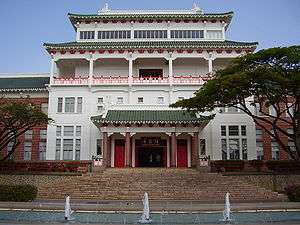 Chinese Heritage Centre, formerly the Administration Building of Nanyang University.
Chinese Heritage Centre, formerly the Administration Building of Nanyang University.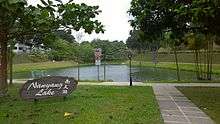 Nanyang Lake
Nanyang Lake
Novena Campus
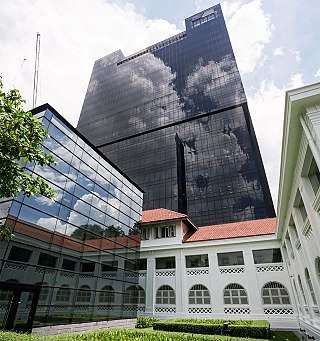
A third campus, Novena Campus, is situated close to LKCMedicine’s partner teaching hospital, Tan Tock Seng Hospital in downtown Novena for medical teaching and research at the Lee Kong Chian School of Medicine. The new 20-storey Clinical Sciences Building was completed in 2016. The CSB is home to LKCMedicine researchers, with the laboratories interconnected through collaborative spaces.
Undergraduate halls
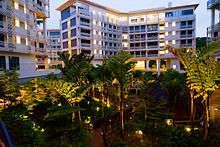
NTU has 24 Halls of Residence for undergraduates, each with a capacity of between 500 and 659 residents. They accommodate 14,000 local and international students,[31] with every freshman guaranteed a hostel room. All halls are co-ed by floor or wing and offer single and double occupancy rooms. Double rooms are shared by residents of the same gender. Every hall has communal facilities like lounges, air-conditioned reading rooms, pantries and laundry rooms with washing machines and dryers. Presently, freshmen students will be guaranteed a room for two years.[32]
Colleges, schools and institutes
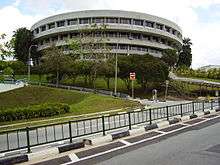
NTU is organised into several colleges and schools, each corresponding to different fields of study.[33] The founding colleges include the College of Engineering, College of Business (Nanyang Business School), Wee Kim Wee School of Communication and Information, and the National Institute of Education, which have been part of NTU since its inception in 1991.
More recently, NTU has established additional schools for the Biological Sciences (2001), Humanities and Social Sciences (HSS) (2004), Physical & Mathematical Sciences (2005), and Art, Design and Media (2009). In 2013, NTU and Imperial College London jointly established a new medical school, the Lee Kong Chian School of Medicine, which is based in the Novena campus along 11 Mandalay Road.[34][35] In October 2016, the University announced that HSS would be expanded into two separate schools, namely the School of Humanities and the School of Social Sciences.
NTU also hosts a number of autonomous institutes: the National Institute of Education, the S. Rajaratnam School of International Studies, and two recently established research institutes.[36]
Nanyang Business School
Nanyang Business School (NBS) is the largest business school in Singapore[37][38] with over 6,800 undergraduates and postgraduates. It is also the No.1 business school in Singapore and 3rd in the Asia-Pacific region according to the Financial Times. For 13 consecutive years since 2004, the Nanyang MBA has been ranked the best in Singapore according to The Economist. NBS has more than 160 professors from more than 20 countries, proficient in 30 languages holding doctorates from the most renowned universities in the world. This makes NBS one of the largest business schools in the world in terms of faculty strength.[39][40]
NBS is the only business school in Singapore to offer the 3-year direct-honours single degree programme in Business or Accountancy. Its widely popular double degree programme in Accountancy and Business can be completed within 3.5 – 4 years, and the newly introduced integrated Bachelor & Master's programme takes 4 years to complete. Students enrolled into the Business programme are allowed to specialise in their penultimate year of study in one of six areas, namely: Actuarial Science, Banking & Finance, Business Analytics, Human Resource Consulting, Marketing, Risk Management and Insurance. Those who choose to major in Banking & Finance have the added option to choose one of three specialised tracks which include 'Platform-based Learning' and 'International Trading'. NBS also houses the 165-square meter Centre for Applied Financial Education, the largest finance lab in Singapore. The new lab is equipped with 60 dedicated Thomson Reuters Eikon terminals with Datastream, along with 24 Bloomberg terminals that will allow business school students to access all kinds of real-time financial, economic and business news information.[41]
College of Humanities, Arts, and Social Sciences
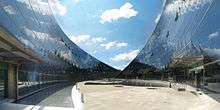
HASS consists of four schools:
- The Wee Kim Wee School of Communication and Information is a school of communication studies and offers courses in Journalism, Broadcast, Advertising, Communication Policy and Information Studies. It originally established in 1992 and it was named after Singapore's former president Wee Kim Wee in 1995.
- The School of Art, Design and Media is Singapore's first professional art school and offers an undergraduate programmes in Art, Design, and Media, as well as graduate degrees in arts research. Its building, which features a sloping grassy roof surrounding a central courtyard, is frequently featured in NTU's promotional materials.[42]
- The School of Humanities which offers programmes in a wide variety of fields including Chinese, English Literature, History, Linguistics and Philosophy.
- The School of Social Sciences which offers Economics, Psychology, Public Policy and Sociology.[43]
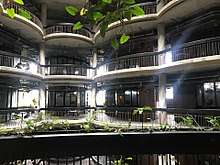 The Hive in Nanyang
The Hive in Nanyang
College of Engineering
The College of Engineering is NTU's largest subdivision. It is claimed to be the world's largest engineering college, with a student population of more than 10,500 undergraduates and 3,500 graduates.[44] It consists of six schools (Chemical and Biomedical, Civil and Environmental, Computer Science and Engineering, Electrical and Electronic, Materials Science, Mechanical and Aerospace) focused on technology and innovation.
The college offers a rich array of multidisciplinary programmes and specialisations in traditional engineering disciplines and beyond. In addition to the 12 single degree programmes, the college also offers double degrees, double majors and integrated programmes as well as the only aerospace engineering programme in Singapore.[45]
College of Science
Today, the college consists of three schools and is home to about 150 faculty members (more than 15 of which are Singapore National Research Foundation Fellows), 340 research staff, 110 administrative and technical staff, 4,000 undergraduate and 750 graduate students.
- The School of Biological Sciences was established in 2002 and offers a variety of programmes in the Biological Sciences and also a unique and innovative "East meets West" double degree programme in Biomedical Sciences and Traditional Chinese Medicine with the Beijing University of Chinese Medicine in China. Students may also pursue a second major in Food Science and Technology to gain understanding about food processes with an engineering and industrial point of view.
- The School of Physical and Mathematical Sciences was established in 2005 and offers various disciplines in Physics, Chemistry, Mathematics. Students also have the choice of several multidisciplinary programmes such as Chemistry and Biological Chemistry with a second major in Food Science and Technology and/or with optional concentrations in current topics such as Green Chemistry and Nanotechnology, Physics with a second major in Mathematical Sciences and the combined major in Mathematics and Economics.
- The Asian School of the Environment is a new interdisciplinary School established in 2015 to focus on Asian environmental challenges, integrating Earth systems, environmental life sciences, ecology, and the social sciences to address key issues of the environment and sustainability. Strong interdisciplinary links between ASE and the Singapore Centre on Environmental Life Sciences Engineering (SCELSE), the Earth Observatory of Singapore (EOS) and the Complexity Institute provide a community for tackling large research questions.[46]
Lee Kong Chian School of Medicine
The Lee Kong Chian School of Medicine was established in 2013 in collaboration with Imperial College London. Prior to its opening in 2013, the school received record donations of S$400 million, including S$150 million from the Lee Foundation. The School’s primary clinical partner is the National Healthcare Group.[47]
Interdisciplinary Graduate School
NTU's Interdisciplinary Graduate School focuses on the key research areas within NTU's Peaks of Excellence in Sustainable Earth, New Media and Future Healthcare. Research in these areas span across different disciplines beyond the conventional school-based programmes. IGS leverages on professors from all the schools and colleges in NTU to undertake interdisciplinary research and to act as advisors for IGS PhD students.[48]
Autonomous Institutes
NTU hosts a number of autonomous research and educational institutes.[49][50]
- The National Institute of Education (NIE), occupying 16 hectares (0.16 km2; 40 acres) in the western part of NTU's Yunnan Garden campus, is Singapore's main teaching college and is run in close collaboration with Singapore's Ministry of Education. Full-time teachers in Singapore's public schools are typically required to complete a post-graduate diploma course at NIE, sponsored by Singapore's Ministry of Education.[51] NIE is also internationally acclaimed and provides educational consultancy to countries from Indonesia to UAE.
- The S. Rajaratnam School of International Studies (RSIS), named after Singapore's former Deputy Prime Minister and Minister for Foreign Affairs, offers graduate programmes in international relations and is an autonomous graduate institution of NTU. The school has the Institute of Defence and Strategic Studies—long recognised as a world authority on strategic studies and terrorism. RSIS was ranked second among university-affiliated think tanks in Asia in the 2011 Global Go-To Think Tank Rankings.
- The Singapore Centre on Environmental Life Sciences Engineering (SCELSE) is a unique interdisciplinary Research Centre of Excellence (RCE), funded by National Research Foundation, Singapore Ministry of Education, Nanyang Technological University and National University of Singapore. Hosted by the NTU in partnership with NUS, SCELSE is linking new insights from the Life Sciences with expertise from the emerging technologies in Engineering and Natural Sciences to understand, harness and control microbial biofilm communities. The union of these fields has established a new discipline of Environmental Life Sciences Engineering.
- The Earth Observatory of Singapore (EOS) is an autonomous research institute specialising in Earth Sciences and conducts fundamental research on earthquakes, volcanoes, tsunamis & climate change in and around Southeast Asia, towards safer and more sustainable societies.
Clubs and communities
Currently, there are more than 100 student organisations in NTU.[52][53]
University rankings
| University rankings | |
|---|---|
| Global | |
| ARWU World[54] | 115 |
| Times World[18] | 52 |
| USNWR World[19] | 55 |
| QS World[20] | 12 |
| Regional | |
| Times Asia[21] | 4 |
| QS Asia[22] | 1 |
QS World University Rankings
NTU has been ranked 11th in the world and 1st in Asia in the latest 2018 QS World University Rankings.[23] The QS Asia University Rankings 2018 ranked NTU 1st in Asia, displacing NUS which dropped to 2nd place.[24] NTU also came in overall 1st in the world in the ranking of young universities for four consecutive years in the QS Top 50 Under 50 rankings from 2015 to 2018.[25] In 2011, NTU became the first university in Asia to receive the maximum five stars under the QS Stars evaluation system, and the only one in Singapore to date.[26]
QS World University Rankings by Broad Subject Area and Specific Subject
In 2017, NTU's Engineering and Technology was ranked 4th in the world and 1st in Asia by the QS World University Rankings by Broad Subject Area - Engineering and Technology 2017. NTU also has a research citation that is among the top four in the world, with its research output being ranked among the top three universities globally in Engineering by Essential Science Indicators of Thomson Reuters.[27] In the 2017 QS World University Rankings by Broad Subject Area, NTU is ranked 22nd in the world for Social Sciences and Management for three consecutive years. Social Sciences and Management includes the Wee Kim Wee School of Communication and Information, National Institute of Education, Nanyang Business School and School of Social Sciences.[28] In the field of Natural Sciences, NTU's College of Science is ranked 17th in the world, a drop of 2 places from the previous year, while Arts & Humanities (consisting of the School of Humanities and School of Art, Design and Media) is ranked 51st globally, a drop of 6 places from the previous year.
In the 2017 QS World University Rankings by subjects published, NTU had 19 subjects in the world's top 50, with two subjects in the global top 10. It also came in first in Asia for Materials Science and Electronic Engineering.
Times Higher Education World University Rankings
NTU is ranked 4th in Asia in the Times Higher Education Asia University Rankings 2017, a drop of 2 places from the previous year.[55] In 2017, NTU rose to 52nd position worldwide in the Times Higher Education World University Rankings[56] with strong scores in all the categories measured, particularly for research, citations, international outlook as well as industry income and innovation. As a result, NTU rocketed a total of 122 places since 2011 in the THE rankings. NTU is also ranked 3rd best among the global young universities under 50 years old, a drop of 1 place from the previous year.[57]
Academic Ranking of World Universities and other rankings
Independently, the 2017 Academic Ranking of World Universities published by the Shanghai Ranking Consultancy that ranks universities' research performance and places a high weightage on the number of Nobel Prizes and Fields Medals won by a university’s alumni and faculty placed NTU 115th worldwide and 2nd in Singapore.[54] NTU president Bertil Andersson had voiced out in 2015 that the ARWU ranking methodology is inherently biased against young universities like NTU.[58] Nevertheless, in the same ranking, ARWU places NTU's engineering faculty at No.2 in the world.[9]
NTU's Nanyang Business School is Singapore's top business school, having ranked 24th worldwide in the 2017 Financial Times Global MBA Rankings.[59] For the 13th straight year, Nanyang Business School has been ranked the best in Singapore by The Economist.[60] Also, NBS is placed 10th worldwide in the Financial Times’ (FT) rankings of the world’s top 100 Executive MBA (EMBA) programmes.[61] Accounting research at NBS is rated 7th in the world and remained No. 1 in Asia by the Brigham Young University (BYU) Accounting Research Rankings released in April 2014. NTU Professor Tan Hun Tong is currently the world's top accounting researcher for the third year running while Professor Clive Lennox is ranked 7th in the world and 2nd in Asia.[62] Notably, Professor Vijay Sethi was voted the world's best business professor as the sole recipient of the prestigious Business Professor of the Year award from The Economist Intelligence Unit (EIU) in March 2013, beating top business professors from Harvard Business School, Wharton Business School and London Business School.[63]
The S. Rajaratnam School of International Studies has been ranked second among university-affiliated think-tanks in Asia and 22nd internationally.[62]
Notable alumni
Public service and civil society
International
- Major Agus Harimurti Yudhoyono - Tentara Nasional Indonesia, Chief of Operations in Kostrad, son of Susilo Bambang Yudhoyono
- Gen. Tito Karnavian - Indonesian National Police, former Head of Detachment 88, elite anti terror group in Indonesian police, former head of Jakarta Regional Police Division, now head of Indonesian National Police.
People's Action Party
- Ang Mong Seng – Former MP
- Intan Azura Mokhtar – MP, Assistant Professor at National Institute of Education
- Lee Bee Wah – MP
- Low Yen Ling – MP, Parliamentary Secretary
- Masagos Zulkifli - MP, Minister for Environment & Water Resources
- Sim Ann – MP, Minister of State
- Inderjit Singh – Former MP
- Teo Ser Luck – MP, Mayor and Minister of State
- Yu-Foo Yee Shoon – Former MP and Minister of State
- Zaqy Mohamad – MP
Workers Party of Singapore
- Gerald Giam Yean Song - NCMP
- Low Thia Khiang – MP, Secretary-General of the Workers Party of Singapore
- Yee Jenn Jong – NCMP
Singapore Democratic Party
- Cheo Chai Chen – former MP, now member of the National Solidarity Party
National Solidarity Party
- Sebastian Teo Kway Huang – President of the National Solidarity Party
Business and technology
- Tan Chin Hwee - CEO of Trafigura
- Chade-Meng Tan – Jolly Good Fellow, Google Inc
- Pulkit Jaiswal - award-winning serial entrepreneur known for his work in the field of unmanned aerial vehicles.
Academia and research
- Yew-Kwang Ng – Albert Winsemius Professor of Economics at NTU and Emeritus Professor in Department of Economics, Monash University
Arts and humanities
- Ho Ho Ying - Abstract artist.
- Liang Wern Fook - Composer, poet and essayist.
- Zihan Loo – film director, actor, dancer.
Media and entertainment
- Annette Lee - actress, writer, singer-songwriter
- Vincy Chan – Cantopop singer
- Lee Teng – television host
- Ng Hui – actress
- Rui En – actress
- Joanne Peh – actress
- Michelle Saram – actress
- Diana Ser – journalist, former Channel News Asia news presenter, actress, host
- Stefanie Sun – singer
- Alan Tern – actor
- Jerry Yeo – actor
- Zhu Zhiqiang – graphic designer, animator
- Youyi - actress, television host
- Ling Kai - singer-songwriter
- Boon Hui Lu - singer-songwriter
Sports
- Dipna Lim Prasad – National Hurdler
- C Kunalan - Former National Sportsman, and Educator at the National Institute of Education
- Calvin Kang Li Loong - National Sprinter
- Lee Wung Yew - Multiple SEA Games gold medallist in shooting.
Notable faculty
Medicine, science and engineering
- Bertil Andersson – Biochemistry
- Freddy Boey – Materials Engineering
- Balazs Gulyas – Neuroscience
- Philip Ingham – Zebrafish models for Human diseases
- Christopher G. Newhall – Volcanologist, co-creator of the Volcanic explosivity index
- Daniela Rhodes – Structural and Molecular Biology
- Kerry Sieh – Geology and Seismology
- Rudolph A. Marcus – Nobel Laureate in Chemistry 1992
Humanities and social sciences
- Grace Chia – Literature
- Liang Wern Fook - Chinese Studies, Mandopop singer-songwriter, Xinyao pioneer
- Nadia Magnenat Thalmann - Computer graphics
Business and technology
- Vijay Sethi – First Economist Intelligence Unit Business Professor of the Year
Wee Kim Wee School of Communication and Information
- Joseph Walther – Communication theorist
- Richard Ling – Social consequences of mobile communication
S. Rajaratnam School of International Studies
- Farish A. Noor – Political Scientist and Historian
Controversies & Incidents
Renaming controversy
Although NTU occupies the grounds of the former Nanyang University (NU), and has a similar name, it is not a direct continuation of that institution. In 1980, the Government of Singapore forcibly merged Nanyang University with the University of Singapore to form the present-day National University of Singapore (NUS). This was a source of significant discontent amongst NU students and alumni, because NU had been a Chinese-medium university, whereas the newly merged NUS was (and is) an English-medium university.
As NTU subsequently grew into a full university, various efforts were made to have it claim the Nanyang University mantle. In 1996, the alumni rolls of Nanyang University were transferred from NUS to NTU. In 1998, the prominent local calligrapher and poet Pan Shou, who had been the first vice-chancellor of Nanyang University, called for NTU to be renamed Nanyang University, as a way to "quieten the hearts of many" NU alumni.[64] In 2003, this idea received further support from NTU president Su Guaning, during an interview with the Chinese-language paper Lianhe Zaobao. One reason offered for the renaming was that, by the mid-2000s, NTU no longer had a narrow focus on technical subjects, but had become a full university including studies in the humanities.
However, the NTU administration's renaming plans soon encountered significant push-back. One NU alumni, Zhu Yong-an, circulated the results of a straw poll in which NU alumni came out strongly against the idea; respondents complained that NTU could not provide "continuity" for the "murdered" Nanyang University.[65] Finally, after Prime Minister Lee Hsien Loong weighed in on the affair,[66] the administration dropped the idea quietly in 2006 and has not raised it since.
Tenural denial to Cherian George
In 2013, there was a debate over academic freedom in Singapore when Associate Professor Cherian George, an outspoken academic at the Wee Kim Wee School of Communications who had publicly criticised Singapore's system of media control and its ruling People’s Action Party.[67] did not get tenured. Although George had been recommended for tenure by the Wee Kim Wee School, his application was turned down by a university-level committee which included representatives from the Government of Singapore. One of the reviewers for the tenure case, Cardiff University's professor Karin Wahl-Jorgensen, expressed outrage at NTU's decision,[68] and George's thesis advisor, Stanford University's Theodore Glasser, raised doubts about "NTU's reputation as a university of international standing" and "NTU's commitment to academic freedom".[69] Despite a petition against the tenure decision by students at the Wee Kim Wee School, George's appeal against the tenure decision was subsequently rejected by the university.[70]
See also
References
- ↑ "Post-secondary education". Ministry of Education, Singapore. Ministry of Education, Singapore. Archived from the original on 2008-04-05. Retrieved 11 June 2015.
- ↑ "Nanyang Technological University: A Stellar Year Annual Report 2012" (PDF). Nanyang Technological University. Feb 2013. Archived (PDF) from the original on 15 January 2014. Retrieved 19 November 2013.
- 1 2 "Facts and Figures: 2015 Faculty and Staff population". Nanyang Technological University. Nov 2015. Archived from the original on 16 September 2014. Retrieved 16 September 2014.
- ↑ "Nanyang Technological University (NTU)". sguni. Archived from the original on 30 December 2013. Retrieved 30 December 2013.
- ↑ Parr, Chris (2015-03-27). "The 7 fastest-rising young universities in the world". Times Higher Education. Retrieved 2018-10-11.
- ↑ "Nanyang Technological University, Singapore". Times Higher Education (THE). Archived from the original on 27 August 2018. Retrieved 27 August 2018.
- ↑ Nanyang Technological University. "Undergraduate Student Enrolment". Archived from the original on 16 September 2014. Retrieved 11 November 2015.
- ↑ Nanyang Technological University. "Graduate Student Enrolment". Archived from the original on 16 September 2014. Retrieved 11 November 2015.
- 1 2 "Academic Ranking of World Universities in Engineering/Technology and Computer Sciences - 2016 - 2016 Top 100 Universities in Natural Sciences and Mathematics - ARWU-FIELD 2016". www.shanghairanking.com. Archived from the original on 15 June 2017. Retrieved 14 June 2017.
- ↑ "Engineering and Technology". 3 March 2017. Archived from the original on 9 August 2017. Retrieved 14 June 2017.
- ↑ "Business school rankings from the Financial Times - FT.com". rankings.ft.com. Archived from the original on 13 June 2017. Retrieved 14 June 2017.
- ↑ "2016 MBA & Business School Rankings | Which MBA?". The Economist. Archived from the original on 14 March 2017. Retrieved 11 July 2018.
- ↑ "Check In to Check Out". www.hey.ntu.edu.sg. Archived from the original on 7 July 2016. Retrieved 21 June 2016.
- 1 2 Mavis Toh. "NUS versus NTU: Looking beyond the rankings". Archived from the original on 8 April 2016. Retrieved 6 June 2016.
- 1 2 李光耀回忆录 1965 2000. Singapore: 新加坡联合早报. 2000. p. 176. ISBN 978-981-04-2978-2.
南大校园成立附属过大的南洋理工学院的院址。1991年它升格为南洋理工大学。
- ↑ "Our History". Archived from the original on 21 July 2015. Retrieved 17 July 2015.
- ↑ "ARWU World University Rankings 2018 - Academic Ranking of World Universities 2018 - Top 500 universities - Shanghai Ranking - 2018". www.shanghairanking.com. Archived from the original on 16 August 2018. Retrieved 16 August 2018.
- 1 2 "World University Rankings". 18 August 2017. Archived from the original on 6 September 2017. Retrieved 4 October 2017.
- 1 2 "{title}". Archived from the original on 2 August 2018. Retrieved 2 August 2018.
- 1 2 "QS World University Rankings 2019". 29 May 2018. Archived from the original on 9 June 2017. Retrieved 12 June 2018.
- 1 2 "Asia University Rankings". 14 March 2017. Archived from the original on 17 August 2017. Retrieved 4 October 2017.
- 1 2 "QS University Rankings: Asia 2018". 12 October 2017. Archived from the original on 16 June 2016. Retrieved 17 October 2017.
- 1 2 "QS World University Rankings 2018". Archived from the original on 9 June 2017. Retrieved 15 September 2016.
- 1 2 Quacquarelli Symonds. "QS Asia University Rankings 2018". Archived from the original on 16 June 2016. Retrieved 17 October 2017.
- 1 2 Quacquarelli Symonds. "QS University Rankings: Top 50 Under 50". Archived from the original on 15 June 2013. Retrieved 17 October 2017.
- 1 2 "QS Stars evaluation system". Archived from the original on 1 October 2011.
- 1 2 "NTU Rankings and Ratings". Archived from the original on 3 December 2013. Retrieved 2 December 2013.
- 1 2 "QS World University Rankings by Broad Subject Area 2017 - Social Sciences and Management". Quacquarelli Symonds. Sep 2017. Archived from the original on 11 October 2017. Retrieved 17 October 2017.
- ↑ "Nanyang Lake" (PDF). Archived (PDF) from the original on 2 April 2015. Retrieved 4 March 2015.
- ↑ "Youth Olympic Village". Archived from the original on 18 July 2010.
- ↑ "Halls". www.ntu.edu.sg. Archived from the original on 31 July 2016. Retrieved 16 July 2016.
- ↑ hermesauto (16 March 2017). "Freshmen at NTU assured of 2-year stay in hostels". Archived from the original on 11 November 2017. Retrieved 11 November 2017.
- ↑ Nanyang Technological University. "NTU Colleges and Schools". Archived from the original on 17 October 2014. Retrieved 16 September 2014.
- ↑ "Stop-work order issued after fatal worksite accident at Lee Kong Chian School of Medicine". AsiaOne. 17 February 2016. Archived from the original on 21 February 2016. Retrieved 18 February 2016.
- ↑ "Joint Medical School". Archived from the original on 19 August 2018. Retrieved 28 September 2018.
- ↑ "Colleges & Schools". www.ntu.edu.sg. Archived from the original on 19 August 2018. Retrieved 19 August 2018.
- ↑ NanyangBizSchool [@NanyangBizSch] (4 July 2016). "Relevant programmes, outstanding #faculty, hands-on business experience! #NBS boasts the largest cohort in Singapore" (Tweet) – via Twitter.
- ↑ "Nanyang Business School". www.facebook.com.
- ↑ "Nanyang Business School at Nanyang Technological University". Archived from the original on 27 July 2016. Retrieved 16 July 2016.
- ↑ "Faculty Directory". Nanyang Technological University. Archived from the original on 6 February 2018. Retrieved 28 September 2018.
- ↑ "Nanyang Business School unveils Singapore's largest finance lab". Archived from the original on 21 August 2016. Retrieved 16 July 2016.
- ↑ Nanyang Technological University. "The ADM Building". Archived from the original on 13 March 2014.
- ↑ "About Us". Nanyang Technological University. Archived from the original on 19 August 2018. Retrieved 19 August 2018.
- ↑ Nanyang Technological University. "NTU at a glance". Archived from the original on 13 March 2014. Retrieved 12 March 2014.
- ↑ "About Us". Nanyang Technological University. Archived from the original on 19 August 2018. Retrieved 19 August 2018.
- ↑ "Dean's Message". Nanyang Technological University.
- ↑ "Our School". www.lkcmedicine.ntu.edu.sg. Archived from the original on 19 August 2018. Retrieved 19 August 2018.
- ↑ "About Us". Nanyang Technological University. Archived from the original on 19 August 2018. Retrieved 19 August 2018.
- ↑ "Autonomous Institutes". Nanyang Technological University. Archived from the original on 19 August 2018. Retrieved 19 August 2018.
- ↑ "Institutes & Centres". www.ntu.edu.sg. Archived from the original on 19 August 2018. Retrieved 19 August 2018.
- ↑ Ministry of Education, Singapore. "Applying to be a teacher". Archived from the original on 12 March 2014.
- ↑ "Students' Union and its Constituent Clubs". www.ntu.edu.sg. Archived from the original on 19 August 2018. Retrieved 19 August 2018.
- ↑ "NTU: Campus & Communities: Clubs & societies". www.ntu.edu.sg. Archived from the original on 19 August 2018. Retrieved 19 August 2018.
- 1 2 "ARWU World University Rankings 2017 - Academic Ranking of World Universities 2017 - Top 500 universities - Shanghai Ranking - 2017". www.shanghairanking.com. Archived from the original on 15 August 2017. Retrieved 4 October 2017.
- ↑ "The Times Higher Education Asia University Rankings 2017". Archived from the original on 17 August 2017. Retrieved 4 October 2017.
- ↑ "Top 100 – The Times Higher Education World University Rankings 2017–2018". Archived from the original on 6 September 2017. Retrieved 4 October 2017.
- ↑ "The Times Higher Education Young University Rankings 2017". Archived from the original on 5 April 2017. Retrieved 17 October 2017.
- ↑ "Take 5 with NTU President - HEY! The NTU Magazine". www.hey.ntu.edu.sg. Archived from the original on 9 December 2015. Retrieved 31 December 2015.
- ↑ "Business school rankings from the Financial Times - FT.com". rankings.ft.com. Archived from the original on 26 January 2016. Retrieved 25 January 2016.
- ↑ "2017 MBA & Business School Rankings - Which MBA? - The Economist". The Economist. Archived from the original on 16 October 2016. Retrieved 28 September 2018.
- ↑ "Rankings". www.nbs.ntu.edu.sg. Archived from the original on 4 March 2016. Retrieved 25 January 2016.
- 1 2 "NTU Rankings and Ratings". Archived from the original on 3 December 2013. Retrieved 2 December 2013.
- ↑ "World's best business professor walks the talk". Archived from the original on 19 May 2014.
- ↑ "Nantah's spectre haunts NTU's name". The Enquirer (Singapore). Apr 2009. Archived from the original on 12 March 2014.
- ↑ Zhu Yong-an (Jan 2003). "Survey by Zhu Yong-an". Archived from the original on 12 March 2014.
- ↑ Su Guaning. "NTU Convocation 2006". Archived from the original on 3 July 2017. Retrieved 28 September 2018.
- ↑ "NTU professor denied tenure may have to leave job". Archived from the original on 19 June 2013. Retrieved 1 May 2013.
- ↑ "NTU clarifies tenure process after outcry". Archived from the original on 19 June 2013. Retrieved 1 May 2013.
- ↑ "NTU clarifies tenure process after outcry". Archived from the original on 2013-07-03.
- ↑ "NTU rejects outspoken professor's tenure appeal". Archived from the original on 2 May 2013. Retrieved 1 May 2013.
External links
| Wikimedia Commons has media related to Nanyang Technological University. |